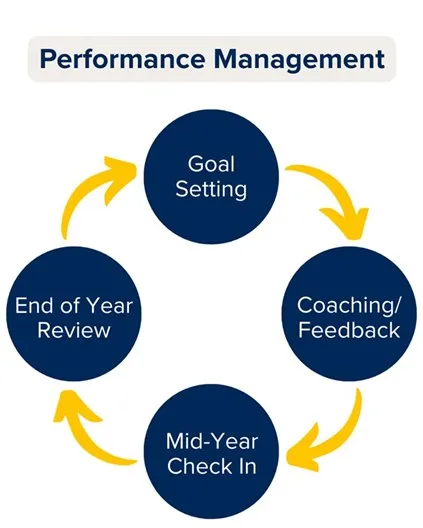Performance Management
At Bryn Mawr, an employee’s performance directly impacts the institution’s profound mission “to educate students to the highest standard of excellence.” By striving for excellence and creating an open and welcoming environment, staff at Bryn Mawr help achieve the College’s goals and contribute to creating a positive learning environment for our students.
Performance Management is a process that fosters a culture of continuous feedback and improvement, supports our ongoing effort to promote staff growth and development, and aligns employee performance with department and College-wide goals.
The Performance Management process includes setting goals and expectations, coaching, providing feedback, and rewarding performance. It is an opportunity for self-reflection, redirection, review, and establishing goals through mutual constructive conversation. Effective performance management enhances staff communication and engagement, provides a clear path for growth, and fosters a more fulfilling work experience.
System Key Features:
- Goal setting and development planning – Employee and manager meet to establish mutually agreed upon goals and expectations for the year ahead
- Coaching and development- Ongoing conversations between the employee and manager to discuss accomplishments and challenges related to the individual’s work priorities, goals, and professional development
- Mid-year performance check-in- Managers and employees use this conversation to recognize accomplishments, clarify expectations, and redirect efforts as necessary
- End-of-Year review - Employee and manager discuss overall performance throughout the past year. The conversation also provides space to talk about goals and expectations for the coming year
2025 Performance Management Cycle Timeline
- June: Staff completes self-evaluation
- July: Manager completes evaluation
- August: Manager and Staff member meet for Year End Review
- August-September: Staff and Manager complete Performance Goals and Development Planning
Performance Management Year End Review Process
The year end performance evaluation is a shared two-way dialogue between an employee and their manager. Although a manager has the primary responsibility to conduct the performance evaluation, the employee’s participation and contribution is an integral part of the overall process. The year-end review is the summary of the year long conversations between an employee and a manager and reflects the expectations, achievements and development opportunities of the prior year as well as beginning to establish goals for the upcoming year.
Self-Evaluation
As you prepare for your evaluation, consider the job responsibilities outlined in your job description and the goals/expectations from the prior year. Review your accomplishments and milestones and their impact to the department and the College, examining both the “what” was accomplished as well as “how” work was approached using Bryn Mawr competencies such as communication, collaboration, critical thinking, and leadership. Identify what things got in the way of you achieving your goals or tasks and what resources or support you need that will enable you to be the most effective in your role. Utilize the Year-End Review form for your Self-Evaluation.
End-of-Year Conversation Guide
Before the meeting, the manager reviews the employee self-evaluation along with their own observations and progress against goals. Both manager and employee engage in a dialogue focused on accomplishments, challenges, use of competencies and impact with a high degree of mutuality and understanding. It is important to avoid surprises; any performance issues need to be addressed through ongoing feedback throughout the year. The conversation then culminates in a forward-looking discussion, collaboratively discussing goals for the upcoming year that align both with the employee’s professional development aspirations and the College and department’s goals.
*** Click here for the End of Year Performance Review Form STAFF ***
*** Click here for the End of Year Performance Review Form SERVICE CRAFT ONLY ***
